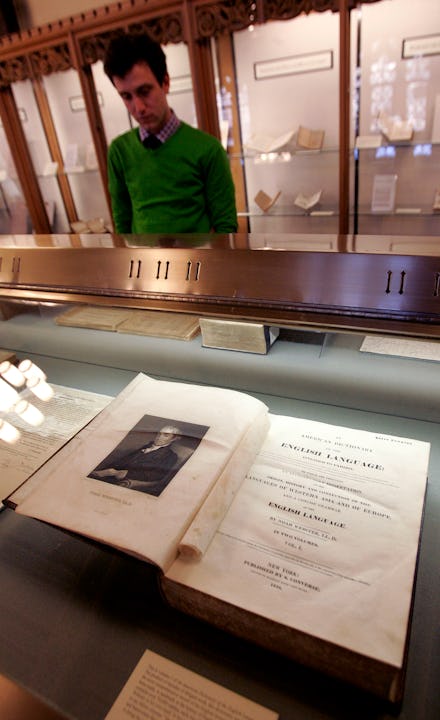5 Ways Noah Webster Made the English Language American

At the risk of showing my age, I will admit that I began school before the advent of spell-check. When I didn't know how to spell a word, my teachers told me to look it up in the dictionary. I never really figured out how I was supposed to manage that if I couldn't spell it in the first place, but I can thank Noah Webster for making the attempt possible. Webster, whose name has become almost a generic term for dictionaries, changed the way English was written to make it a truly American language.
October 16 would have been Webster's 255th birthday, so, to mark the occasion, check out how Webster left his mark on our language. I promise you won't have to look up any words.
1. He pioneered American textbooks
Webster was a true American before there was even a USA. At a time when many of the powerful people in the country had still been born in England, he was born in Connecticut in 1758. He was the descendant of a Connecticut governor, a leader of the Pilgrim settlement at Plymouth, and came of age during the American Revolution. As his patriotic contribution to the fledgling United States, Webster was adamant that American children should be taught with textbooks written in America instead of books written in England that indoctrinated allegiance to the king.
2. He gave us the first American dictionary
Besides having American textbooks, Webster believed that having an Americanized version of English was the first step to truly asserting independence as a nation. "Now is the time and this the country in which we may expect success in attempting changes to language, science and government. Let us then seize the present moment and establish a national language as well as a national government," wrote Webster. His 1806 dictionary was the first American dictionary but his 1828 version, which completely changed how dictionaries were formatted, is his most lasting work. You can browse the 1828 dictionary's entries online.
Now is the time and this the country in which we may expect success in attempting changes to language, science, and government. Let us then seize the present moment and establish a national language as well as a national government - See more at: http://connecticuthistory.org/noah-webster-and-the-dream-of-a-common-language/#sthash.bSkyiE4d.dpuf
Now is the time and this the country in which we may expect success in attempting changes to language, science, and government. Let us then seize the present moment and establish a national language as well as a national government - See more at: http://connecticuthistory.org/noah-webster-and-the-dream-of-a-common-language/#sthash.bSkyiE4d.dpuf
Now is the time and this the country in which we may expect success in attempting changes to language, science, and government. Let us then seize the present moment and establish a national language as well as a national government - See more at: http://connecticuthistory.org/noah-webster-and-the-dream-of-a-common-language/#sthash.bSkyiE4d.dpuf
Now is the time and this the country in which we may expect success in attempting changes to language, science, and government. Let us then seize the present moment and establish a national language as well as a national government - See more at: http://connecticuthistory.org/noah-webster-and-the-dream-of-a-common-language/#sthash.bSkyiE4d.dpuf
3. He simplified spelling
Let's face it: in America, we may complain about irregular verbs when we try to learn a foreign language, but English is really hard too. Webster tried his best to make it a simpler language to manage. He deleted many silent letters in English words when he put together his dictionary (for example, '-our' endings lost their 'u' so 'honour' becoming 'honor' and '-ck' endings lost their 'k'). Other words had letters rearranged to be more in line with their pronunciation ('-re' endings switched to '-er', i.e. centre became center).
4. He tried (and failed) to make words shorter and more phonetic
Try as he might to make some alternate spelling stick, some of Webster's changes just didn't last. Many of the discarded changes were his attempts to shorten words. Making 'ch's into 'sh's, trying to change 'island' to 'iland' and dropping the last 'e' in 'determine' is understandable, but the English language is probably more pleasant today because changes like 'tongue' becoming 'tung' didn't last.
5. He championed the alphabet as we know it
Changing up the way words are spelled may be Webster's largest contribution to American English, but he even had an impact on the very building blocks of language: letters. Founding Father Benjamin Franklin, a mentor of Webster, advocated getting rid of the letters c, w, y, and j. Franklin wanted to then replace them with 6 new letters. Webster chose to keep those letters when he put together his dictionary. He also added two letters that we still use today, 'j' and 'v.' Previously, 'j' and 'v' were simply listed as alternate forms of 'i' and 'u,' but Webster chose to give them their own sections in his dictionary. So thank Webster next time you sing the alphabet song with a child.